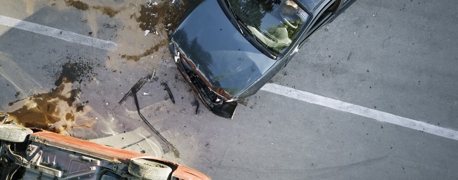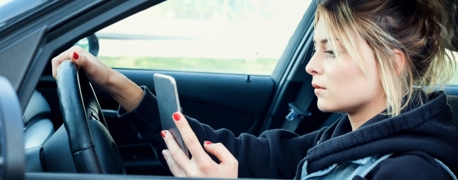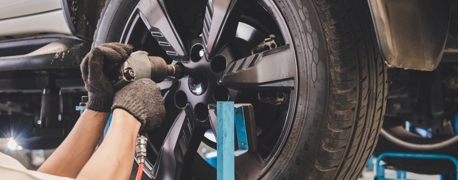5 Types of Dangerous Holiday Driving Hazards

The holidays are a joyful time for many, but they can also be uniquely dangerous, especially on the roads. This comes from increased hazards on U.S. roadways caused by drunk driving, heavy weather, stress, and increased traffic, to name a few. Rising traffic fatalities during the winter months demand that we be even more vigilant on the road; it starts with understanding what hazards we may face, and why.
Here are five driving hazards that get more dangerous during the winter holidays.
1. Fatigue
Tired or drowsy driving is a cause behind a fifth of all fatal car accidents. It’s clear why: the impact of tired driving is comparable to drinking and driving. One study found that driving after being awake for 18 hours affected performance the same as having a blood alcohol level of .05%. The legal limit to operate a motor vehicle is .08%, but a driver’s abilities may be impaired well before then.
The effect of fatigue is only going to get worse—Americans are getting less sleep than ever. It’s estimated that the average adult needs to sleep for seven to nine hours each night, and yet more than one third of adults in the U.S. report getting less than seven hours of sleep a night. Nearly half of all Americans report feeling sleepy at some point during the day at least three to seven days a week, and more than 6,000 fatal car accidents are caused by drowsy driving each year.
The holidays affect sleep in several ways. Heightened drinking, rich foods, and social demands of the holidays mean people are getting a lot less sleep in general. Holiday stress lowers the quality of our sleep, compounding the effects of fatigue. Traveling can also affect one’s ability to sleep, particularly when changing time zones or traveling long distances within a short amount of time. One may assume that people sleep more during the holidays, but the opposite is often true.
When you take to the roads this holiday season, be aware that there may be fatigued drivers out there. Do not get behind the wheel if you feel too tired to drive.
2. Weather
According to the United States Department of Transportation’s Road Weather Management Program (RWMP), more than 70% of U.S. roads are located in areas where it snows. During the winter holidays, snow, sleet, and other inclement weather can greatly increase the likelihood of traffic fatalities. More than 1,300 people lose their lives and more than 116,800 are injured in accidents on snowy or icy roads each year. Nearly 900 people lose their lives and 76,000 are injured in accidents while sleet or snow is actively falling.
Sudden freezing temperatures and heavy rainfall all but guarantee icy roads during the holiday months. In 2021, the world learned that Texas winters are a force to be reckoned with. On February 11, icy roads caused a massive 130-vehicle pileup on I-35W in Fort Worth. Six people were killed and dozens were injured as cars, trucks, and massive 18-wheelers lost control and collided with one another over a scene that stretched nearly a mile.
In a bizarre and terrifying incident that took place in January 2022, an Ohio Turnpike snowplow driver sprayed snow and ice onto oncoming traffic as he barreled down the road. Nearly 20 people were injured, and 55 vehicles were involved in collisions as a result of the onslaught.
Now, as we face another winter, we need to be aware of the serious hazards that cold temperatures and heavy weather can bring. A good place to start is by reviewing the NHTSA’s winter weather driving tips.
3. Alcohol
Alcohol use causes a third of all fatal vehicle accidents in the U.S. every single year. On average, we see a 20% increase in traffic fatalities in the United States over major holidays, as compared to other times of the year.
Not only does society as a whole drink more during the holidays, but time off work and more social gatherings mean that more people are drinking at the same time. Drinking is socially acceptable—and even expected—during the holidays. Take a New Year’s toast, for example. Alcoholic beverages are also more readily available. This makes drunk driving more prevalent during the holidays; the rising number of people on the road on holiday weekends increases the odds that a drunk driver will cause irreparable harm.
Alcohol significantly impairs a driver’s judgment, decision-making abilities, and reaction times. Even a small amount can lead to risky behaviors such as speeding, running red lights, or making illegal turns. This is especially dangerous during the holidays when roads are busier, and weather conditions may be unfavorable. The winter weather we experience during the holidays can decrease visibility and make roadways more dangerous, which means intoxicated drivers will have to attempt to manage these hazards while their abilities are impaired. This can prove disastrous.
4. Vehicle Maintenance
Vehicle maintenance is a year-round issue—federal statistics show that 12% of all accidents are caused by mechanical defects. However, inclement weather can heighten the risk of defects, particularly tire problems. Old tires with low tread are more likely to cause a loss of control in icy or rainy conditions.
The holidays can indirectly affect your vehicle’s condition as well. Salting the road to prevent ice can also corrode the underside of your car. The corrosion heightens the chance of a serious malfunction on the road.
If you’re taking a road trip over the holidays or are staying in town but need to get around, you can take a few steps to make sure your vehicle is winter-ready. Get your car serviced, check your tires, carry extra supplies, make sure you have gas, and check the weather before you leave. Doing these things can help ensure your car is prepared for snow, rain, and other harsh weather we see during the holidays.
5. Stress
A 2006 study from Greenberg Quinlan Rosner found that people in the U.S. are likely to suffer from extra stress during the holidays due to financial pressures, time pressures, workplace issues, and high-running emotions. According to a study conducted by Sesame in 2022, 64% of Americans are affected by financial stress during the holidays, which has remained consistent year over year.
While the holidays can bring a lot of joy, getting together with family and taking time off work can add to one’s stress. High levels of stress can affect memory and mood, and it can even lead to depression and anxiety.
Holiday stress can make it more likely for drivers to engage in aggressive or risky driving behaviors, which can increase the likelihood of a crash. Let’s consider a fictional character, John, who is driving his three children to a Thanksgiving dinner at his parents’ house. John spent the last three days of his short work week staying up late to complete a project on time. He also had to find a recipe for green bean casserole and cook it, which his wife used to do, but now he’s divorced and he has the kids for Thanksgiving. So, he left his house late and is trying to get to his parents’ house on time. The kids are fighting in the backseat. The casserole is precariously perched on the seat next to him. He doesn’t even notice that he’s starting to drift into the adjacent lane as he reaches over to steady the casserole while asking the kids for the ninth time to be quiet.
And that’s just a made-up example involving a busy, working dad. Stressed drivers are also more likely to drive drunk, which brings us back to item #3.
What We Can Do About It
Stress, bad weather, drinking, fatigue—all of these issues are interlaced with one another and can make the roads more dangerous than ever during the holidays. But, we can take steps to protect ourselves and our loved ones. We can enjoy a safe night out during the holidays. We can take a moment to breathe. We can check the weather and avoid driving when it’s too nasty out. We can take the keys away from a friend or family member who has had too much to drink—before they get behind the wheel. We can try to limit our stress by just saying “no” to an outing that we just don’t have time for. Or maybe we just bring a store-bought casserole to Thanksgiving dinner. By putting safety first, we have more of a chance of avoiding holiday driving hazards.


